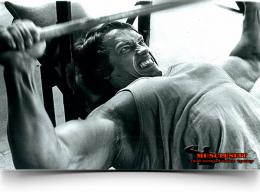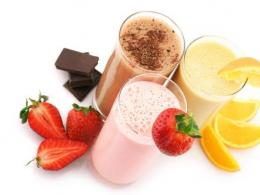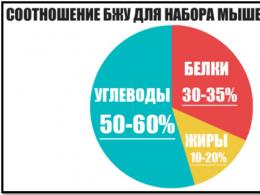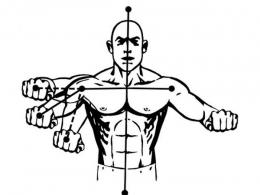How to create a nutrition program for gaining muscle mass?
Content:
What diet to follow and how to choose foods when gaining muscle mass.
Muscle growth improves the appearance of a person, which is why nutrition for gaining muscle mass is becoming increasingly popular. Women, building up muscles, remain thin, but gain tone and elasticity. Men are getting stronger, bigger and more athletic.
Muscle cells (myocytes) are actively involved in metabolism, improve insulin control, help burn more calories. Mass training combined with proper nutrition protects against sarcopenia - the loss of myocytes with age. With a sedentary lifestyle, muscle fibers break down and are replaced by fat.
How do muscles respond to calories? How many do you need?
With a decrease in calories, there is a risk of losing muscle mass and slowing down metabolism. The study found that diets without training burned the same amount of fat and muscle. As a result, the percentage of body fat may even increase.
To gain 0.5 kg of muscle, 2800 calories are required mainly due to protein, but taking into account physical activity. Contractile proteins and fluid (sarcoplasm) in muscle fibers break down and rebuild every 7-15 days. Training changes protein metabolism, affects the type and amount of fiber produced. But really overloaded muscles are able to grow even during fasting, drawing energy from fat reserves. Good nutrition for mass increases the body's response to stress.
Principles of Nutrition for Muscle Growth
The formation of new muscle fibers is based on food high in protein, carbohydrates and calories. However, the menu for the set should not include sausages, fast food and sweets.
For example, Hollywood actors, in preparation for a role, build a diet on:
- chicken
- avocado;
- spinach and tomatoes;
- for breakfast - a protein shake with almond milk and berries.
To gain dry mass, you need to understand that the body needs carbohydrates during the period of exercise. When hitting the gym in the morning, you should eat starchy foods before and after your workout, and then reduce their intake in the evening.
A diet low in carbs and high in lean protein helps protect blood vessels with antioxidants, speeds up cell division, and reduces inflammation.
Glycogen is a form of carbohydrate storage in muscle fibers, the amount of this energy reserve affects anabolism. Thus, it is necessary to eat more carbohydrates than are burned during the day's activity and training.
The protein must be 30-40% diet:
- muscles are made up of protein and water;
- it promotes recovery after a hard workout;
- daily consumption is from 100 to 300 g with a weight of 50-100 kg;
- excess protein intake (from 3 g per kg of body weight) does not accelerate weight gain;
- consumption of less than 1.5 g per kilogram of body slows down muscle growth.
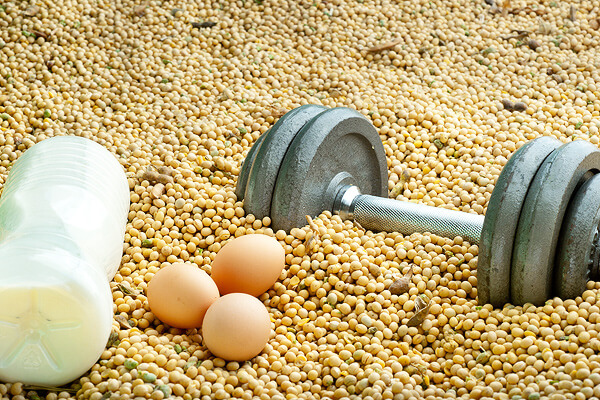
Carbohydrates should be 40-60% from the calorie content of the diet:
- to grow, you need to increase the weight of the shells in training, and carbohydrates are needed for energy;
- if they are deficient, the body will burn the incoming protein or muscles, which will make it impossible to gain mass;
- reducing their number in the menu causes lethargy, fatigue and reduces interest in training.
Fats should be 10-20% diet:
- they are necessary for the production of hormones;
- when using lean meat and dairy products, fats must be added using vegetable oils.
The starting ratio of BJU in the diet should be 40/20/40 (for ectomorphs, a greater bias towards carbohydrates is possible), while the energy value will be in the corridor of 2000-4000 kcal.
However, there is no perfect formula, and one has to use an adjustment found by experience:
- in the absence of a set, we increase calorie content by 10% due to protein and carbohydrates;
- when gaining fat, you need to reduce the proportion of carbohydrates to 30% and fats to 10%;
- with a lack of energy, you can increase the amount of carbohydrates up to 60%, reducing the amount of proteins and fats.
It is necessary to constantly adjust the nutrition program for gaining muscle mass, choosing a “working” ratio.
Product selection
Foods for gaining muscle mass include not only proteins:
- Lean beef, chicken fillet, veal. Cattle meat contains a lot of conjugated linoleic acid, which helps burn fat and build muscle.
- Beet acts as a source of betaine, which improves liver function and joint regeneration, increases strength and endurance, increasing the level of nitric oxide.
- Buckwheat refers to slow carbohydrates, increases the level of growth hormone, contributing to the set of clean mass.
- refers to fruits that help maintain the acid-base balance in the body and ensure muscle growth.
- Cottage cheese rich in casein, which nourishes the muscles during sleep (if taken in the evening) and helps to avoid severe hunger during fat burning.
- Eggs stimulate muscle strength with the help of protein and yolk, cholesterol in which, contrary to popular belief, is not associated with atherosclerosis.
- Milk combines whey and casein rich in glutamine. Whole milk (not store-bought) provides 70% more useful omega-3 acids.
- millet groats contains up to 12 g of protein per 100 g, and also increases the level of insulin-like growth factor (igf-1), which is important for building strength, protects against toxins. Pearl barley has antibacterial properties, improves metabolism. Both cereals do not contain gluten, unlike oats.
- Spinach is a source of glutamine for muscle growth.
- apples and cherries with the help of polyphenols, reduce muscle fatigue and soreness.
- homemade yogurt sugar-free contains up to 10 g of protein per 100 g and less carbohydrates, ideal for snacking.
- Legumes(beans, chickpeas and lentils) contain vegetable protein, which replenishes amino acids.
- germinated wheat includes zinc, iron, selenium, potassium and B vitamins, fiber, arginine and glutamine.
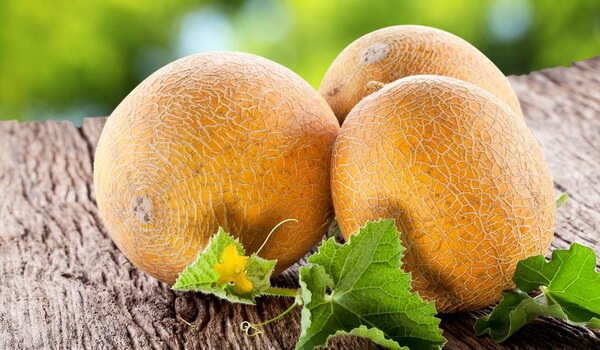
Diet when gaining muscle mass
Pledge of growth - meals every 2-3 hours. You need to plan up to six meals a day, balanced in composition. For example:
- First: 2 boiled eggs + 6 egg whites, oatmeal (buckwheat) - 100 g of cereals, a spoonful of honey, a banana.
- Second: boiled chicken fillet 150 g, 40 g low-fat cheese, cucumber and tomato, whole grain bread with peanut butter or a handful of nuts.
- Third: durum wheat pasta (100 g), steamed cutlets (200 g), sauce based on tomatoes, garlic and herbs.
- Fourth: stewed chicken fillet (150 g), lentils or beans (200 g), coleslaw with cucumber.
- Fifth (post-workout): protein powder shake, half a liter of milk, 1-2 bananas.
- Sixth: baked fish, green beans and beetroot salad with garlic and walnuts.
Such nutrition for weight gain for men will provide calories in the region of 3300 kcal due to 300 g of protein, 400 g of carbohydrates and 60 g of fat.
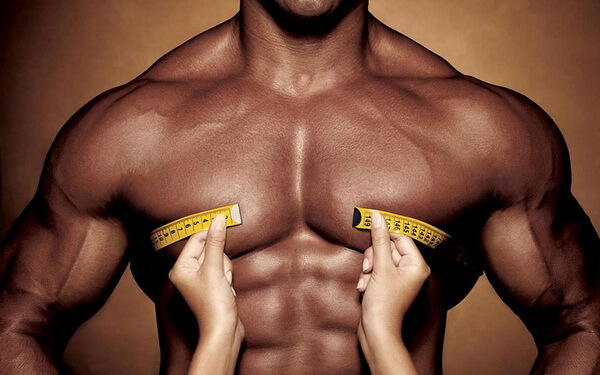
Is it possible to make mass collection more accessible?
- Protein foods are more expensive than carbohydrate foods. The most affordable bodybuilding products are chicken, eggs and cottage cheese. For a day, you will need about 500 g of chicken breasts, 400 g of homemade cottage cheese with a fat content of less than 5%, 10 eggs, 50 g of low-fat cheese.
- Cabbage remains the cheapest source of fiber.
- Beetroot is a healthy starchy carbohydrate with a low raw glycemic index, organic acids and minerals.
- Oatmeal is one of the cheapest sources of carbohydrates, it can be alternated with buckwheat and rice.
- As fats, you can use nuts, flaxseed oil and raw seeds.
- Bananas and apples with the addition of milk will become components of protein shakes.
- You should not save on protein powders when choosing egg - it will cost no less than fresh eggs, and the benefits of them are much higher.
It is worth including a complex protein in the budget food for gaining muscle mass in order to get the missing protein norm.


